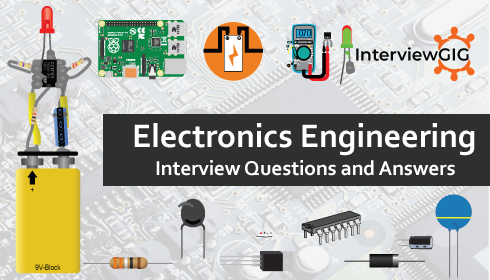What are the responsibilities of electrical and electronics engineers?
Electrical engineers typically do the following:
- Design new ways to use electrical power to develop or improve products.
- Do detailed calculations to develop manufacturing, construction, and installation standards and specifications.
- Direct manufacturing, installing, and testing of electrical equipment to ensure that products meet specifications and codes.
- Investigate complaints from customers or the public, evaluate problems, and recommend solutions.
- Work with project managers on production efforts to ensure that projects are completed satisfactorily, on time, and within budget.
- Electronics engineers typically do the following:
- Design electronic components, software, products, or systems for commercial, industrial, medical, military, or scientific applications.
- Analyze customer needs and determine electrical system requirements, capacity, and cost to develop a system plan.
- Develop maintenance and testing procedures for electronic components and equipment.
- Evaluate systems and recommend design modifications or equipment repair.
- Inspect electronic equipment, instruments, and systems to make sure they meet safety standards and applicable regulations.
- Plan and develop applications and modifications for electronic properties used in parts and systems to improve technical performance.
Electronics engineers who work for the federal government research, develop, and evaluate electronic devices used in a variety of areas, such as aviation, computing, transportation, and manufacturing. They work on federal electronic devices and systems, including satellites, flight systems, radar and sonar systems, and communications systems.
The work of electrical engineers and electronics engineers is often similar. Both use engineering and design software and equipment to do engineering tasks. Both types of engineers also must work with other engineers to discuss existing products and possibilities for engineering.
What is electronics?
Electronic is a study and use of electrical devices that operate by controlling the flow of electrons or other electrically charged particles. Electronics is a subfield within the wider electrical engineering that covers subfields such as analog electronics, digital electronics, consumer electronics, embedded systems and power electronics.
What is the difference between electronic and electrical?
Electronic work on DC and with a voltage range of -48vDC to +48vDC. If the electronic device is plugged into a standard wall outlet, there will be a transformer inside which will convert the AC voltage you are supplying to the required DC voltage needed by the device. Examples are computer, radio, TV, etc.
Electric device use line voltage (120vAc, 240vAC, etc…). Electric devices can also be designed to operate on DC sources but will be at DC voltages above. Examples are incandescent lights, heaters, fridge, stove, etc…
Explain advantages of storage batteries?
Few advantages of storage batteries are:
- Most efficient form of storing energy probably.
- Stored energy is available immediately because there is no lag of time for delivering the stored energy.
- Reliable source for supply of energy.
- The energy can be drawn at a fairly constant rate.
- Explain the application of storage batteries?
- Storage batteries are used for various purposes, some of the applications are mentioned below:
- For the operation of protective devices and for emergency lighting at generating stations and substations.
- For starting, ignition and lighting of automobiles, aircraft’s etc.
- For lighting on stream and diesel railways trains.
- As a supply power source in telephone exchange, laboratories and broad casting stations.
- For emergency lighting at hospitals, banks, rural areas where electricity supplies are not possible.
Why back EMF used for a DC motor? Highlight its significance?
The induced EMF developed when the rotating conductors of the armature between the poles of magnet, in a DC motor, cut the magnetic flux, oppose the current flowing through the conductor, when the armature rotates, is called back EMF. Its value depends upon the speed of rotation of the armature conductors. In starting, the value of back EMF is zero.
What is a System?
When a number of elements or components are connected in a sequence to perform a specific function, the group of elements that all constitute a System.
What is Control System?
In a System the output and inputs are interrelated in such a manner that the output quantity or variable is controlled by input quantity, then such a system is called Control System. The output quantity is called controlled variable or response and the input quantity is called command signal or excitation.
What are different types of Control Systems?
Two major types of Control Systems are:
Open loop Control System
Closed Loop Control Systems
Open loop Control Systems: The Open loop Control System is one in which the Output Quantity has no effect on the Input Quantity. No feedback is present from the output quantity to the input quantity for correction.
Closed Loop Control System: The Closed loop Control System is one in which the feedback is provided from the Output quantity to the input quantity for the correction so as to maintain the desired output of the system.
What is latching current?
Gate signal is to be applied to the thyristor to trigger the thyristor ON in safe mode. When the thyristor starts conducting the forward current above the minimum value, called Latching current, the gate signal which is applied to trigger the device in no longer require to keep the scr in ON position.
What is holding current?
When SCR is conducting current in forward conduction state, scr will return to forward blocking state when the anode current or forward current falls below a low level called Holding current.
What is the difference between holding current and latching current?
Latching current and Holding current are not same. Latching current is associated with the turn on process of the scr whereas holding current is associated with the turn off process. In general holding current will be slightly lesser than the latching current.
What is meant by knee point voltage?
Knee point voltage is calculated for electrical Current transformers and is very important factor to choose a CT. It is the voltage at which a CT gets saturated. (CT-current transformer).
What is the difference between generator and alternator?
Both generator and alternator work on the same principle they convert mechanical energy into electrical energy.
Generator: It converts induced EMF (Electro Motive Force) into direct current, where it based on stationary magnetic field and revolving conductor which rolls on the armatures with slip rings and brushes riding against each other.
Alternator: It has rotating magnetic and stationary armature for high voltage and stationary magnetic field and a rotating armature for low voltage.
Difference between a four point starter and three point starter?
The shunt connection in four-point starter is provided separately from the line where as in three-point starter it is connected with line which is the drawback in three-point starter.
Why the capacitors work on ac only?
Generally, capacitor gives infinite resistance to dc components (i.e., block the dc components). It allows the ac components to pass through.
How many types of Colling system it transformers?
ONAN (oil natural, air natural)
ONAF (oil natural, air forced)
OFAF (oil forced, air forced)
ODWF (oil direct, water forced)
OFAN (oil forced, air forced)
What is the principle of motor?
Whenever a current carrying conductor is placed in a magnetic field it produces turning or twisting movement is called as torque.
What is 2 phase motors?
A two-phase motor is a motor with the starting winding and the running winding have a phase split. Example is AC servo motor. Where the auxiliary winding and the control winding have a phase split of 900.
What is MARX Circuit?
It is used with generators for charging a number of capacitor in parallel and discharging them in series. It is used when voltage required for testing is higher than the available.
Why star delta starter is preferred with induction motor?
Star delta starter is preferred with induction motor due to following reasons:
- Starting current is reduced 3-4 times of the direct current due to which voltage drops and hence it causes less losses.
- Star delta starter circuit comes in circuit first during starting of motor, which reduces voltage 3 times, that is why current also reduces up to 3 times and hence less motor burning is caused.
- In addition, starting torque is increased and it prevents the damage of motor winding.
How can you relate power engineering with electrical engineering?
Power engineering is a sub division of electrical engineering. It deals with generation, transmission and distribution of energy in electrical form. Design of all power equipment also comes under power engineering. Power engineers may work on the design and maintenance of the power grid i.e. called on grid systems and they might work on off grid systems that are connected to the system.
What is encoder, how it function?
An encoder is a device used to change a signal (such as a bit stream) or data into a code. The code may serve any of a number of purposes such as compressing information for transmission or storage, encrypting or adding redundancies to the input code, or translating from one code to another. This is usually done by means of a programmed algorithm, especially if any part is digital, while most analog encoding is done with analog circuitry.
Why Human body feel Electric shock? And in an Electric train during running, we did not feel any Shock? Why?
Unfortunately, our body is a pretty good conductor of electricity, The golden rule is Current takes the lowest resistant path if you have insulation to our feet as the circuit is not complete (wearing rubber footwear which doing some repairs is advisable as our footwear is a high resistance path not much current flows through our body). The electric train is well insulated from its electrical system.
What happen if we give 220 volts dc supply to d bulb r tube light?
Bulbs [devices] for AC are designed to operate such that it offers high impedance to AC supply. Normally they have low resistance. When DC supply is applied, due to low resistance, the current through lamp would be so high that it may damage the bulb element.
Define the term Capacitance and Inductance?
Capacitance: It is the amount of charge that is stored inside a capacitor at a given voltage.
Inductance: It is defined as the property of a coil to resist any changes in electric current flowing through it. Mutual inductance happens when a secondary coil opposes current change in the primary coil.
What are the transformer losses?
Transformer losses have two sources-copper loss and magnetic loss. Copper losses are caused by the resistance of the wire (I2R). Magnetic losses are caused by eddy currents and hysteresis in the core. Copper loss is a constant after the coil has been wound and therefore a measurable loss. Hysteresis loss is constant for a particular voltage and current. Eddy-current loss, however, is different for each frequency passed through the transformer.
What is the full form of KVAR?
We know there are three types of power in Electricals as Active, apparent & reactive. So KVAR is stand for “Kilo Volt Amps with Reactive component”. We know there are three types of power in Electricals as Active, apparent & reactive. So KVAR is stand for “Kilo Volt Amps with Reactive component.
Mention what are the different colors on wires indicates?
The different colors on wires indicates:
Black wire: This wire is used for power supply in all circuits. Any circuits with this color is considered hot or live. It is never used for a neutral or ground wire.
Red wire: This color wire is a secondary live wire in a 220-volt circuit and used in some types of interconnection. You can join the red wire to another red wire or to a black wire.
Blue and Yellow wire: These wires are also used to carry power but are not wiring the outlets for common plug-in electrical devices. They are used for the live wire pulled through the conduct. You will see yellow wire in the fan, structure lights, and switched outlets.
White and Gray: This color wire is used as a neutral wire. It carries the current (unbalanced load) to the ground. You can join white and gray only to other white and gray wires.
Green: It is connected to the grounding terminal in an outlet box and run from the outlet box to the ground bus bar within an electric panel.
Mention how NPN and PNP transistor works?
In a circuit when NPN is used, No current flowing from A to D = No flow from X to Z Current flowing from A to D = Current allowed to flow from X to Z When PNP is used, No current flowing from A to D = Current is allowed to flow from X to Z Current flowing from A to D = No current flow from X to Z.
Mention what is the role of transistor in Circuit?
Transistor has the ability to amplify the current, due to the reason that output power can be higher than the input power.
Explain what rectifiers is and what are the types of rectifiers?
A rectifier is an electrical device that transforms A.C or alternating current into direct current (D.C), which flows in only one direction. The types of rectifiers are:
Half wave rectifier: It uses one p-n junction.
Full wave rectifier: It uses two p-n junctions.
What is slip in an induction motor?
Slip can be defined as the difference between the flux speed (Ns) and the rotor speed (N). Speed of the rotor of an induction motor is always less than its synchronous speed. It is usually expressed as a percentage of synchronous speed (Ns) and represented by the symbol ‘S’.
What happens when two positively charged material is placed together?
When two positively charged material place together it will repel.
What is referred to the electron in the outer orbit?
Electron in the outer orbit is known as valence.
Why AC systems are preferred over DC systems?
Due to following reasons, AC systems are preferred over DC systems:
- It is easy to maintain and change the voltage of AC electricity for transmission and distribution.
- Plant cost for AC transmission (circuit breakers, transformers etc.) is much lower than the equivalent DC transmission.
- From power stations, AC is produced so it is better to use AC then DC instead of converting it.
- When a large fault occurs in a network, it is easier to interrupt in an AC system, as the sine wave current will naturally tend to zero at some point making the current easier to interrupt.
What are the various kind of cables used for transmission?
Cables, which are used for transmitting power, can be categorized in three forms:
- Low-tension cables, which can transmit voltage up to 1000 volts.
- High-tension cables can transmit voltage up to 23000 volts.
- Super tension cables can transmit voltage 66 kV to 132 kV.
What is the difference between Analogue and Digital circuit?
Analog circuit: These circuits operate on continuous valued signals No conversion of the input signal required before transmitting, the circuit directly executes various logical operations and produces an analogue output there is no probability of losing any information as there is no conversion Analogue lacks flexibility.
Digital circuit: These circuits operate on the signal which exist at two level 0’s and 1’s before the signal is transmitted, it is converted into digital form. During signal conversion, amount of information is lost Digital circuits anticipate high flexibility.
What is the difference between MCB & MCCB, where it can be used?
MCB is miniature circuit breaker which is thermal operated and use for short circuit protection in small current rating circuit. MCCB moulded case circuit breaker and is thermal operated for over load current and magnetic operation for instant trip in short circuit condition. Under voltage and under frequency may be inbuilt. Normally it is used where normal current is more than 100A.
Where the lighting arrestor should be placed in distribution lines?
Near distribution transformers and outgoing feeders of 11kv and incoming feeder of 33kv and near power transformers in sub-stations.
what is Zener diode?
Zener diode is a type of Semiconductor diode that allows current to flow in the opposite direction when exposed to enough voltage.
Why back EMF used for a dc motor? Highlight its significance?
The induced EMF developed when the rotating conductors of the armature between the poles of magnet, in a DC motor, cut the magnetic flux, opposes the current flowing through the conductor, when the armature rotates, is called back EMF. Its value depends upon the speed of rotation of the armature conductors. In starting, the value of back EMF is zero.
Why star delta starter is preferred with induction motor?
- Star delta starter is preferred with induction motor due to following reasons:
- Starting current is reduced 3-4 times of the direct current due to which voltage drops and hence it causes less losses.
- Star delta starter circuit comes in circuit first during starting of motor, which reduces voltage 3 times, that is why current also reduces up to 3 times and hence less motor burning is caused.
Define IDMT relay?
It is an inverse definite minimum time relay. In IDMT relay its operating is inversely proportional and also a characteristic of minimum time after which this relay operates. It is inverse in the sense; the tripping time will decrease as the magnitude of fault current increase.
What are the advantages of speed control using thyristor?
Advantages of speed control using thyristor are:
- Fast Switching Characteristics than Mosfet, BJT, IGBT.
- Low cost.
- Higher Accurate.
What are the advantages of star-delta starter with induction motor?
The main advantage of using the star delta starter is reduction of current during the starting of the motor. Starting current is reduced to 3-4 times of current of Direct online starting. Hence the starting current is reduced, the voltage drops during the starting of motor in systems are reduced.
Why Delta Star Transformers are used for Lighting Loads?
For lighting loads, neutral conductor is must and hence the secondary must be star winding. And this lighting load is always unbalanced in all three phases. To minimize the current unbalance in the primary we use delta winding in the primary. So, delta / star transformer is used for lighting loads.
What is rated speed?
At the time of motor taking normal current (rated current) the speed of the motor is called rated speed. It is a speed at which any system take small current and give maximum efficiency.
If one lamp connects between two phases it will glow or not?
If the voltage between the two phases is equal to the lamp voltage then the lamp will glow. When the voltage difference is big it will damage the lamp and when the difference is smaller the lamp will glow depending on the type of lamp.
Two bulbs of 100w and 40w respectively connected in series across a 230v supply which bulb will glow bright and why?
Since two bulbs are in series they will get equal amount of electrical current but as the supply voltage is constant across the bulb (P=V^2/R).So the resistance of 40W bulb is greater and voltage across 40W is more (V=IR) so 40W bulb will glow brighter.
Why temperature rise is conducted in bus bars and isolators?
Bus bars and isolators are rated for continuous power flow that means they carry heavy currents which rises their temperature. So it is necessary to test this devices for temperature rise.
What is the difference between synchronous generator & asynchronous generator?
In simple, synchronous generator supply’s both active and reactive power but asynchronous generator (induction generator) supply’s only active power and observe reactive power for magnetizing. This type of generators are used in windmills.
What is Automatic Voltage regulator (AVR)?
AVR is an abbreviation for Automatic Voltage Regulator. It is important part in Synchronous Generators, it controls the output voltage of the generator by controlling its excitation current. Thus, it can control the output Reactive Power of the Generator.
What is the difference between earth resistance and earth electrode resistance?
Only one the terminals is evident in the earth resistance. In order to find the second terminal, we should recourse to its definition: Earth resistance existing between the electrically accessible part of a buried electrode and another point of the earth, which is far away. The resistance of the electrode and another point of the earth, which is far away.
The resistance of the electrode has the following components:
- The resistance of the metal and that of the connection to it.
- The contact resistance of the surrounding earth to the electrode.
What is the significance of vector grouping in us Transformers?
Every power transformer has a vector group listed by its manufacturer. Fundamentally it tells you the information about how the windings are connected (delta or wye) and the phase difference between the current and voltage. Example is DYN means Delta primary, Wye Secondary and the current is at ‘0’clock deferred to the voltage.
Explain what is used of lockout relay in html voltage?
The lockout relay is generally placed in line before or after the e-stop switch so the power can be shut off at one central location. This relay is powered by the same electrical source as the control power and is operated by a key lock switch. The relay itself may have up to 24 contact points with in the unit itself. This allows the control power for multiple machines to be locked out by the turn of a single key switch.
Mention the methods for starting an induction motor?
The different methods of starting an induction motor
- DOL: direct on-line starter.
- Star delta starter.
- Auto transformer starter.
- Resistance starter.
- Series reactor starter.
What is the power factor of an alternator at no load?
At no load synchronous impedance of the alternator is responsible for creating angle difference. So, it should be zero lagging like inductor.
How to determine the capacitor tolerance codes?
Resolution: In electronic circuits, the capacitor tolerance can be determined by a code that appears on the casing. The code is a letter that often follows a three-dimensional digit number (such as 130z). The first two are the 1st and 2nd significant digits and third is a multiplier code. Most of the time the last digit tells you how many zeros to write after the first two digits and these are read so pico-farads.
What is laser diodes?
Laser diodes are compact transistor like packages with two or more electrical leads. Lasing occurs when stimulated emission results into the amplification of photon confined to the lasing mode. These photons hit back and forth between the back and front mirror, and hence a diverging beam emits from the laser diode packages.
What is meant by reverse polarity and how it can be fixed?
Reverse polarity is referred in a condition where one or more of your receptacles are connected incorrectly. To fix the reverse polarity, check the wire connection at the outlet and inspect your receptacle. A receptacle with reverse polarity will have the white wire screwed to the hot side and the black wire will be connected to the neutral side, if that the case swaps the wires and it will resolves the problem. If it persists, a licensed electrician will be needed.
What are the advantage of freewheeling diode in a Full Wave rectifier?
It reduces the harmonics and it also reduces sparking and arching across the mechanical switch so that it reduces the voltage spike seen in a inductive load.
What is the power factor of an alternator at no load?
At no load Synchronous Impedance of the alternator is responsible for creating angle difference. So, it should be zero lagging like inductor.
What is the function of anti-pumping in circuit breaker?
When breaker is close at one time by close push button, the anti-pumping contactor prevent re close the breaker by close push button after if it already close.
What is stepper motor? What is its uses?
Stepper motor is the electrical machine which act upon input pulse applied to it. it is one type of synchronous motor which runs in steps in either direction instead of running in complete cycle. So, in automation parts it is used.
There are a Transformer and an induction machine. Those two have the same supply. For
Which device the load current will be maximum? And why?
The motor has max load current compare to that of transformer because the motor consumes real power. And the transformer is only producing the working flux and its not consuming… Hence the load current in the transformer is because of core loss so it is minimum.
What is SF6 Circuit Breaker?
SF6 is Sulphur hexa Fluoride gas. if this gas is used as arc quenching medium in a Circuit breaker means SF6 CB.
State thevenin's theorem?
According to thevenin’s theorem, the current flowing through a load resistance Connected across any two terminals of a linear active bilateral network is the ratio open circuit voltage (i.e. the voltage across the two terminals when RL is removed) and sum of load resistance and internal resistance of the network. It is given by Voc /(Ri+RL).
State Norton’s Theorem?
The Norton’s theorem explains the fact that there are two terminals and they are as follows:
One is terminal active network containing voltage sources.
Another is the resistance that is viewed from the output terminals.
The output terminals are equivalent to the constant source of current and it allows giving the parallel resistance. The Norton’s theorem also explains about the constant current that is equal to the current of the short circuit placed across the terminals. The parallel resistance of the network can be viewed from the open circuit terminals when all the voltage and current sources are removed and replaced by the internal desperately
State Maximum power transfer theorem?
The Maximum power transfer theorem explains about the load that a resistance will extract from the network. This includes the maximum power from the network and in this case the load resistance is being is equal to the resistance of the network and it also allows the resistance to be equals to the resistance of the network. This resistance can be viewed by the output terminals and the energy sources can be removed by leaving the internal resistance behind.
Explain different types of D.C motors?
Give their applications Different type of DC motors and their applications are as follows:
Shunt motors: It has a constant speed though its starting torque is not very high. Therefore, it is suitable for constant speed drive, where high starting torque is not required such as pumps, blowers, fan, lathe machines, tools, belt or chain conveyor etc.
Service motors: It has high starting torque & its speed is inversely proportional to the loading conditions i.e. when lightly loaded, the speed is high and when heavily loaded, it is low. Therefore, motor is used in lifts, cranes, traction work, coal loader and coal cutter in coalmines etc.
Compound motors: It also has high starting torque and variable speed. Its advantage is, it can run at NIL loads without any danger. This motor will therefore find its application in loads having high inertia load or requiring high intermittent torque such as elevators, conveyor, rolling mill, planes, presses, shears, punches, coal cutter and winding machines etc.
Explain the terms real power, apparent power and reactive power for ac circuits and also the units used?
Real Power: It is the product of voltage, current and power factor i.e. P = V I cos j and basic unit of real power is watt. I.e. Expressed as W or kW.
Apparent power: It is the product of voltage and current. Apparent power = V I and basic unit of apparent power is volt- ampere. Expressed as VA or KVA.
Reactive Power: It is the product of voltage, current and sine of angle between the voltage and current i.e. Reactive power = voltage X current X sinj or Reactive power = V I sin j and has no other unit but expressed in VAR or KVAR.
Explain thin film resistors and wire-wound resistors?
Thin film resistors: It is constructed as a thin film of resistive material is deposited on an insulating substrate. Desired results are obtained by either trimming the layer thickness or by cutting helical grooves of suitable pitch along its length. During this process, the value of the resistance is monitored closely and cutting of grooves is stopped as soon as the desired value of resistance is obtained.
Wire wound resistors: length of wire wound around an insulating cylindrical core are known as wire wound resistors. These wires are made of materials such as Constantan and Manganin because of their high resistivity, and low temperature coefficients. The complete wire wound resistor is coated with an insulating material such as baked enamel.
What is the comparison between JFET’s and MOSFET’s?
Comparison of JFET’s and MOSFET’s:
- JFET’s can only be operated in the depletion mode whereas MOSFET’s can be operated in either depletion or in enhancement mode. In a JFET, if the gate is forward-biased, excess-carrier injunction occurs and the gate- current is substantial.
- MOSFET’s have input impedance much higher than that of JFET’s. Thus, is due to negligible small leakage current.
- JFET’s have characteristic curves flatter than that of MOSFET is indicating a higher drain resistance.
- When JFET is operated with a reverse-bias on the junction, the gate-current IG is larger than it would be in a comparable MOSFET.
Explain forward resistance, static resistance and dynamic resistance of a P-n junction diode?
Forward Resistance: Resistance offered in a diode circuit, when it is forward biased, is called forward- resistance.
DC or Static Resistance: DC resistance can be explained as the ratio of the dc-voltage across the diode to the direct current flowing through it.
AC or Dynamic Resistance: It can be defined as the reciprocal of the slope of the forward characteristic of the diode. It is the resistance offered by a diode to the changing forward current.
What is working principle of operation of a single-phase transformer?
Working principle of operation of a single-phase transformer can be explained as:
An AC supply passes through the primary winding, a current will start flowing in the primary winding. As a result, the flux is set. This flux is linked with primary and secondary windings. Hence, voltage is induced in both the windings. Now, when the load is connected to the secondary side, the current will start flowing in the load in the secondary winding, resulting in the flow of additional current in the secondary winding.
Hence, according to Faraday’s laws of electromagnetic induction, emf will be induced in both the windings. The voltage induced in the primary winding is due to its self-inductance and known as self-induced emf and according to Lenze’s law it will oppose the cause i.e. supply voltage hence called as back emf. The voltage induced in secondary coil is known as mutually induced voltage. Hence, transformer works on the principle of electromagnetic induction.





